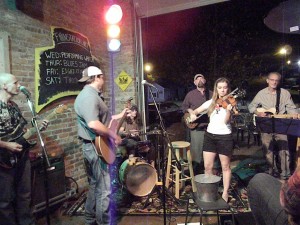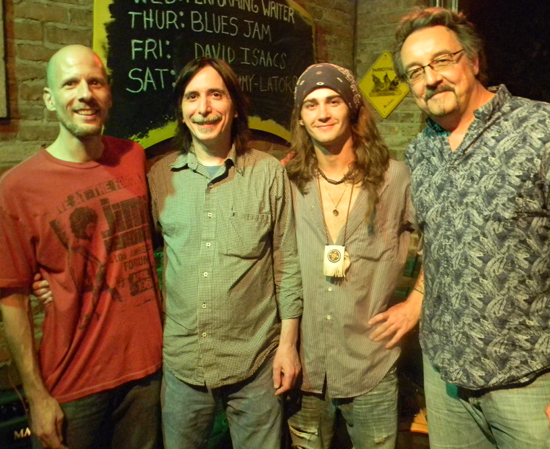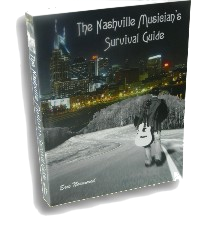nightclub
‘Perspiration not Inspiration’ Ben Hayslip talks Songwriting at the Nashville Berklee Jam
Our latest Nashville Berklee Jam at the Rutledge was a great success. This was our most well attended event to date during which we were treated to a master class about songwriting and some inspired performances during the jam that followed. On this night we were very fortunate to have hit songwriter and Peach Pickers member, Ben Hayslip as our special guest. I would like to thank fellow alum and guest blogger Shantell Ogden ’05 for writing the following article.
‘Perspiration not Inspiration’ Ben Hayslip talks Songwriting at the Nashville Berklee Jam
By Shantell Ogden, ‘05
Ben Hayslip found his way from Evans, Georgia to the top of the country music charts. And, we were lucky enough to hear his story at the most recent Nashville Berklee Jam at The Rutledge in downtown Nashville, hosted by Eric Normand. 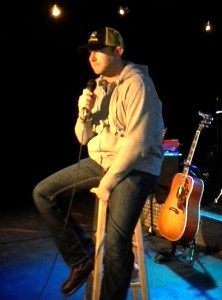
Ben attributes his success in the music business to three things: refusing to fail, working hard at it every day and writing songs that he loves.
But navigating the industry wasn’t always an easy journey for Ben, who took his mom’s advice and moved to Nashville in 1994 to join his childhood friend Rhett Akins (who then had a record deal).
On one hand, Ben had three publishing offers after his first year in Nashville to choose from. He had his first cuts within a couple of years with Trace Akins and Blackhawk. Other successes in his career, though, he worked for years to see.
“I spent a lot of years trying to be someone I just wasn’t,” says Ben. “I was trying to write songs that I thought other people would like, and put more chords in them because I thought I should. The moment I started to forget about what was on the radio and just write what I loved, things started to change in my career.”
Ben had built up a successful company selling ball caps on the side while writing songs to provide for his growing family. He would sell caps from 7:00 a.m. until 1:00 p.m. every day, then write in the afternoon. His business was really taking off when he got a call from Rusty Gaston.
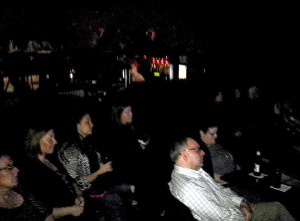 Rusty was starting a new publishing company, This Music, and he wanted Ben to be his first signed writer, but there was a condition.
Rusty was starting a new publishing company, This Music, and he wanted Ben to be his first signed writer, but there was a condition.
“Rusty told me that he would only sign me if I focused on 100 percent on writing songs, not selling ball caps,” Ben recalls. “He said that he believed that I had it in me to be a songwriter of the year. It was a really important shift in my focus and career.”
Haylip’s career really started to hit a new level when he focused on writing songs and ‘doing what he loved.’ When Ben and Rhett connected with Dallas Davidson, something even more magical started to happen.
“We just instantly knew each other because we had all grown up in Georgia,” says Ben. “They understood who I was. We started writing songs that we loved and wanted to listen to, and it turns out that other people loved them too.”
Their ‘tailgate and truck’ songs resonated with people and redefined country music. The songwriting trio, known as the Peach Pickers, has churned out dozens of hits in recent years, Ben with 15 number ones in five years to his credit.
“Even though I have a lot of songs in my catalog I can’t sing, I can sing and play every one of my hit songs,” says Ben. “I’m not the best musician or singer, but I think that if I can sing it so can Bubba driving down the road in his truck. There’s something to that kind of
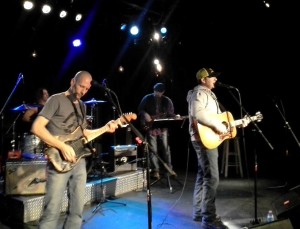
Ben Hayslip performing hits with Eric Normand (guitar), Mike Chapman (bass) and Nick Forchione (drums).
simplicity.”
Ben recognizes that even though tailgates and trucks are still very real to him because of his rural roots, country music needs to shift into something different because “it’s all been done.” He’s working on figuring out what’s next every day he writes.
So what’s next for this two-time Songwriter of the Year winner?
“I’d really like to someday be inducted into the Georgia Music Hall of Fame along with some of the legends I grew up listening to like Ray
Charles and Otis Redding,” he says.
Given his work ethic, long list of success and passion for doing what he sets out to do, I have no doubt that it’s just a matter of time.
For more information about Ben, find him on facebook or follow him on twitter. You can also watch Ben’s talk and performances in their entirety below, special thanks to Jack Zander for videotaping this event.
http://www.youtube.com/watch?v=flAH56OPHRc&feature=youtu.be
http://www.youtube.com/watch?v=HTz1gzvhbvI&feature=youtu.be
http://www.youtube.com/watch?v=JQlUYv5rq9M&feature=youtu.be
http://www.youtube.com/watch?v=s-OsurnB0PQ&feature=youtu.be
The Berklee Nashville Jam is a bi-monthly event held on the last Monday of every other month at the Rutledge and hosted by Berklee alum, Eric Normand ‘89. The event, which is open to the public, is free for alumni and a guest; and $5 for non-alums. After the guest speaker, attendees are welcome to jam with the house band and others from the Nashville music community. For more information about the Berklee Nashville Jam, visit www.nashvilleberkleejam.com.
Nashville Performance Coach, Diane Kimbrough speaks at the Nashville Berklee Jam – October 28, 2013
Monday, October 28 was another great Nashville Berklee Jam, and our special guest on that night was Nashville’s most in-demand performance coach, Diane Kimbrough. Early on in her talk Diane addressed the essence of performance coaching.
“Why do we need live performance coaching, why isn’t it good enough to just play great music…? We don’t make money from music, music is free. 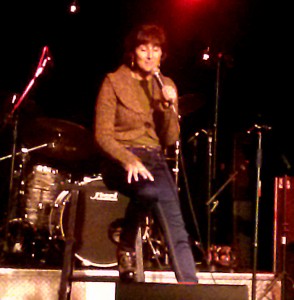 Artists make money from touring and from merchandise… You have got to give an audience a tremendous experience that is beyond what the music is, otherwise why are they going to pay $75 for a concert ticket when they can get the music for free…”
Artists make money from touring and from merchandise… You have got to give an audience a tremendous experience that is beyond what the music is, otherwise why are they going to pay $75 for a concert ticket when they can get the music for free…”
She continued, “…That’s why it’s so important for your success as an artist to really put a lot of effort into fine tuning your show and your relationship with three things on stage; your audience, your band, and your instrument”
She explained that you need to “create an experience” and that you need to “go deep into your music and find what speaks to your audience”.
The music that is dearest to my heart would be most American roots music recorded up to the mid-1970’s, music born of an era when the visual presence of an artist played a lesser role. Back then, the power of the music itself was more integral to an artist’s success. Well you know the old saying, “video killed the radio star”. As much as I would rather just get lost in my music during a live performance, I do realize that if I fail to acknowledge my audience and bring them into the show they are less likely to “get” my music. After all, it’s no longer 1969, and I’m not performing at the Fillmore.
Diane continued, “Everything you do on stage should be a reflection of what you’re doing musically and lyrically…How might somebody else think about your song?… They’re not into how cool you play it but how you make them a part of it.”
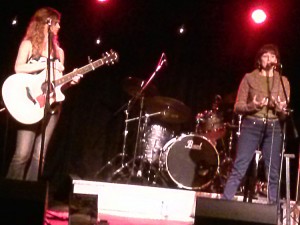 To demonstrate how this works, Diane critiqued several performances throughout the night. After each performance Diane would make some critiques and suggestions, and then the performer tried it again with the new ideas in mind. I must say that everybody showed immediate improvements. I even put myself on the chopping block, performing one of my originals. Diane stopped us half way through the first verse and asked
To demonstrate how this works, Diane critiqued several performances throughout the night. After each performance Diane would make some critiques and suggestions, and then the performer tried it again with the new ideas in mind. I must say that everybody showed immediate improvements. I even put myself on the chopping block, performing one of my originals. Diane stopped us half way through the first verse and asked
“Who are you playing for?”
“I’m playing for you guys”, I answered.
“You could’ve fooled me, because you came up and started looking right there at the floor, and there’s all of us out here that missed you on that wonderful intro.”
I explained that I was actually looking down at my left hand on the guitar, which happens to be in line with the floor, perhaps a habit that many of us guitar players have.
“You’re up there for us to have a good time… you have to engage us visually. That’s not just you, that’s for everybody”, Diane commented, motioning to the other players in my band. “Otherwise, you’re playing for yourselves, and you can do that in your bedroom. The song doesn’t start when the lyrics start, the song starts when you walk on stage.”
We tried the song again, but this time I made it a point to look ahead and into the crowd, making eye contact with several people while engaging in a few visual enhancements. I have to say that the performance was instantly more powerful, drawing a more notable response from the crowd. After the second chorus of the song Diane stopped us midway through my guitar solo.
“What I’m getting is ‘I’m playing this cool music’, what I want you to play is, ‘let me give you a gift of this cool music’. I want you to play, ‘hey guys, listen to this, this is for you’. You’re not playing it because it’s cool, you can do that in your bedroom. You’re playing it because you want them to have this. Give it away as a gift…do the physical things that say this is for you.”
She also addressed my other bandmates.
“Mike (our bassist), you’re [conveying] hey man what do you think of this? And he’s going (motioning to our drummer), ‘man, that’s cool’. And you’re also [conveying] to the audience, ‘what do you think of this, want some of this?’
We tried the performance one last time and, needless to say, the different mindset not only translated into a deeper connection with our audience and a bigger response, but also made for a better musical performance. Diane commented on our improvements and finished her part of the night with a few more remarks.
“What you always have to do is stay aware of the reason that you’re there, which is, the audience. You’re there so that they have an experience, they’re not there so you have an experience. They really don’t care if you’re having a good time, if you get to have a good time that’s the icing on the cake… you have to translate everything you’re doing to the fact that your there so that they have a good time. God knows in this industry we’re not here for the money… you’re here because you want to make them have an experience, that’s why you get to keep coming up here and doing it, because you made them have an experience. If you love what you do and you want to keep doing it you have to do it because of the audience…after all, they paid the cover; they already gave something to you.”
If you’d like to learn more about Diane or e-mail her some questions, please visit her website.
The Nashville Berklee Jam is held at The Rutledge on the last Monday of every other month, with the next event to take place on Monday, February 24, (guest speaker TBA).
For more info about future events, please visit the Nashville Berklee Jam website NashvilleBerkleeJam.com
If you would like to learn more about the Nashville music industry, please check out my website and book “The Nashville Musician’s Survival Guide”.
Nashville Berklee Jam with Bryan Beller – April 29, 2013 – Videos
For those of you who missed our second Nashville Berklee Jam at the Rutledge, you missed quite a special night. Berklee alum and bassist for Steve Vai and Joe Satriani, Bryan Beller shared a fascinating story and some great insight, as well as a great performance with our house band and his wife, Kyra Small. Fortunately, we captured the whole evening on video (special thanks to Jack Zander for filming and video editing). Here are some highlights from this great night!
Bryan’s Talk
“Mercy, Mercy, Mercy” performed by Bryan Beller and the house band
“Signed, Sealed, Delivered” performed by Bryan & the house band, vocals by Kyra Small
“Cissy Strut” performed by Bryan Bller and the house band
“Ain’t No Sunshine” performed by Bryan & the house band, vocals by Kyra Small
Here are some links to performances from the jam portion of this event:
The Nashville Berklee Jam is held at The Rutledge on the last Monday of every other month, with the next event to take place on Monday, October 28 with special guest, performance coach, Diane Kimbrough.
For more info about future events, please visit the Nashville Berklee Jam website NashvilleBerkleeJam.com
If you would like to learn more about the Nashville music industry, please check out my website and book “The Nashville Musician’s Survival Guide”.
Dave Pomeroy at the Nashville Berklee Jam, June 24, 2013: Videos
Here’s the videos of Dave Pomeroy speaking at our June Nashville Berklee Jam, plus a video of Dave performing one of his original tunes “Old Friends”. Video courtesy Jack Zander.
Dave Pomeroy Talk – Building a Career in a Changing Music Industry – Part 1
Dave Pomeroy Talk – Building a Career in a Changing Music Industry – Part 2
“Old Friends” – performed by Dave Pomeroy
The Nashville Berklee Jam is held at The Rutledge on the last Monday of every other month, with the next event to take place on Monday, October 28 with special guest, performance coach, Diane Kimbrough.
For more info about future events, please visit the Nashville Berklee Jam website NashvilleBerkleeJam.com
If you would like to learn more about the Nashville music industry, please check out my website and book “The Nashville Musician’s Survival Guide”.
A-list bassist and Union President, Dave Pomeroy speaks at the Nashville Berklee Jam; June 24, 2013
by Eric Normand
Long before recording with artists like Emmy Lou Harris, Alison Krauss, and Peter Frampton, Nashville Musicians Union President and our guest speaker on this night, Dave Pomeroy was learning how to play the standup bass in a school orchestra in Virginia. Growing up as the son of a military man, Dave experienced life in a few different places and also learned how to play the electric bass before eventually permanently relocating to Nashville in 1977. Following a musical heart inspired by the British Invasion, his foray into the world of the fretless bass would eventually come full circle when his skills landed him session work with Keith Whitley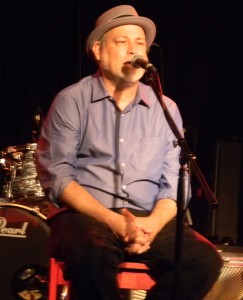 and Trisha Yearwood many years later.
and Trisha Yearwood many years later.
The road that led to A-team session work in the Nashville studio scene of the 80’s and 90’s was filled with a plethora of life and music enriching experiences. Working with the legendary Don Williams from 1980 to 1994 was a “journey into minimalism” which ultimately taught him the power of the song. Under the wing of this world-class songwriter and performer, Dave learned how to become a great songwriter, studio musician and producer in his own right.
“Don changed my life… these are all things he taught me, just by example and by encouraging me and giving me respect…”
A key moment in Dave’s life came 10 days after he finished recording on Keith Whitley’s fourth album, when the legendary singer died suddenly of an alcohol overdose.
“…It really shook me up and I realized that I was not at a good place in my life, I needed to change some things and make myself a happy person…it really did change my life and made me realize that life is precious and you better get on with what you’re trying to do…”
Dave continued on as an in-demand session player, his work with Keith Whitley ultimately leading to recording the bass tracks on Trisha Yearwood’s first seven albums as well as countless other major-label projects.
“One of the lessons that I really want to impart is that you have to listen to your inner voice when it talks to you, because if you don’t, it will stop talking…”
He joined the Nashville Musicians Union, AFM Local 257 in 1978, gradually becoming more and more involved in the years that followed. As the years rolled by he became frustrated with the status quo of the Union, feeling there was a growing “disconnect between players and leadership”. In 2008 he ran for union president and won the election. Dave shared that the Musicians Union has totally changed, both here and nationally and spoke about its role in regards to the rights of the individual musician.
“It’s really about trying to spread the word that it’s okay to take care of business, and not all musicians are good at that…in this day and age, if you don’t protect yourself who’s going to? If the Musicians Union doesn’t have your back, it’s you against the music business, good luck with that, it works for some people, but at the same time it’s good to know that there are resources and that you do have something you can fall back on.”
One of his roles as union president is fighting for musician and songwriter rights to be paid for their work, and the reality of digital piracy.
“We’ve been through this terrible thing with digital piracy… it really just decimated the way things were. But now we’re starting to see that people are actually understanding that it’s not that big of a deal to spend $1.29 or $.99 to buy a song instead of stealing it, and that if you want to have a music business in the future it may not be there if you’re not willing to pay for stuff…it’s okay to be a consumer, it’s okay to be a fan, I’m still a fan.”
Near the end of Dave’s talk he shared a few pieces of advice one can only learn from a lifetime of pursuits in the music business:
- Take nothing for granted
- Don’t be afraid to ask questions
- There are no stupid questions
- Strive to play with players who are better than you
- Be honest with yourself
- Be a nice person, nobody wants to work with a jerk
- Don’t take it personal if you don’t get the call
- Owning your own stuff is the way of the future
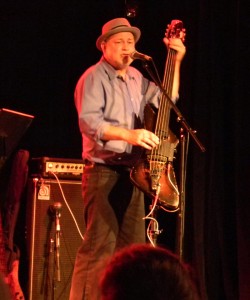 After some questions and answers Dave played a brief set of original solo material using a very unique approach. Tying into his theme of “individual entrepreneurship in a changing music scene” he used two basses, one on a stand and one he wore around his neck to create loops on the fly using a loop machine. He then sang tunes over the loop accompanying his performance on the second bass by playing secondary parts, fills and solos. It was an inspired performance that everyone seemed to thoroughly enjoy.
After some questions and answers Dave played a brief set of original solo material using a very unique approach. Tying into his theme of “individual entrepreneurship in a changing music scene” he used two basses, one on a stand and one he wore around his neck to create loops on the fly using a loop machine. He then sang tunes over the loop accompanying his performance on the second bass by playing secondary parts, fills and solos. It was an inspired performance that everyone seemed to thoroughly enjoy.
His portion of the night concluded, and the open jam began featuring a combination of Berklee alumni and others from the Nashville music community. The jam covered a lot of ground, everything from blues jams to original songs by some up-and-coming Nashville songwriters.
I would like to extend a big thank you to Dave Pomeroy for sharing his wisdom and music, Jack Zander for videotaping this event, The Rutledge, Berklee alumni volunteers Shantell Ogden, Heston Alley, Blake Branch, and everyone else who came out for this event. See you at the next one!
The Nashville Berklee Jam is held at The Rutledge on the last Monday of every other month, with the next event to take place on Monday, August 26 when I will be giving a talk about navigating the Nashville Music Industry
For more info about future events, please visit the Nashville Berklee Jam website NashvilleBerkleeJam.com
If you would like to learn more about the Nashville music industry, please check out my website and book “The Nashville Musician’s Survival Guide”.
Nashville Berklee Jam with Dallas Davidson – February 18, 2013 – Part II
By Eric Normand
We were only halfway through our very first Nashville Berklee Jam at The Rutledge and those in attendance had received some amazing perspective, and enjoyed an inspired performance from one of Nashville’s top songwriters, Dallas Davidson. After Dallas’s portion of the night was 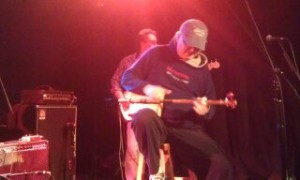 over we took a moment to reorganize and then began the open jam portion of this night.
over we took a moment to reorganize and then began the open jam portion of this night.
Among those who performed were alums, Amanda Williams (also one of the organizers of this event), Mason Stevens, who played a Delta blues instrument known as the “Diddly Bo”, drummers, John Rodrigue and Russell Garner, and bassist, Austin Solomon (Austin took a means solo in Cissy Strut). A few others from the Nashville music community also sat in on drums, Austin Marshall and Tom Drenon.
All the performances were strong and everyone who participated had a great time, but don’t take my word for it, check out the videos below to get a better idea of what can happen at The Nashville Berklee Jam!
The Nashville Berklee Jam is held at The Rutledge on the last Monday of every other month, with the next event to take place on Monday, April 29 featuring special guest, Bassist, Bryan Beller (Joe Satriani, Steve Vai, Mike Keneally) who will also be joined by his wife, Kira Small.
For more info about future events, please visit the Nashville Berklee Jam website NashvilleBerkleeJam.com
If you would like to learn more about the Nashville music industry, please check out my website and book “The Nashville Musician’s Survival Guide”.
Nashville Berklee Jam with Dallas Davidson, February 18, 2013 – Part I
By Eric Normand
A cold, damp rainy night wasn’t enough to stop Berklee alumni and others from converging on one of Nashville’s coolest venues, The Rutledge in what would be the first Nashville Berklee Jam to be held in downtown Nashville. Monday, February 18 marked the one-year anniversary of this event which had previously been held in the suburb of Kingston Springs, and the move to downtown aims to kick the event’s profile up a notch as this centrally located venue is perhaps one of the finest performance rooms in the city.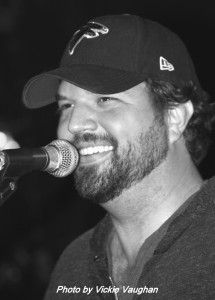
People began rolling in around 6:30, and the guest speaker on this night, 2012 NSAI, ACM, and BMI songwriter of the year, Dallas Davidson began his portion of the night shortly after 7:00 PM. Dallas, Rhett Akins, and Ben Haslip, make up the songwriting team known as “The Peach Pickers”, who in recent years have become the most successful songwriting team in the history of Nashville. Since moving to Music City from Albany, GA in 2004 Dallas has had over 100 of his compositions recorded including 13 number one hits – “Gimme That Girl”, “Just a Kiss”, “The One That Got Away”, and “I Don’t Want This Night to End”, to name a few.
I gave him a brief introduction, he spoke briefly about his journey to Nashville and how he got his start as an “in-the- trenches commercial songwriter”, and then he quickly got into some questions and answers.
In response to a question about naysayers along the way during the years leading up to his recent success, Dallas candidly responded:
“The list is long and distinguished… starting with my dad… [Laughs]… a lot of publishing companies passed on me, all of ‘em did… the first time around and the second time around.”
He went on to tell of how he got his first big break, a story which underscores the importance of a person’s character.
“A guy named Brett Jones actually signed me to a publishing deal. He started a company called Big Borassa, I was his first writer that he ever signed, and he swears that he didn’t even listen to my songs; he just got to know me and believed in me… I was very, very fortunate to have somebody like that guy come in there and give me a shot and write with me and teach me a lot of stuff.”
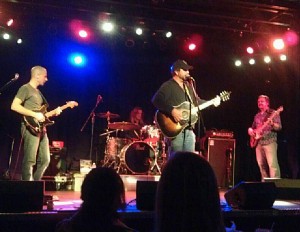 Dallas spoke about how he uses his small-town roots to provide topics to write about, as he wants to be “the mouthpiece” of his rural friends. He shared that he likes to write the melody first, then the groove before starting on the lyrics.
Dallas spoke about how he uses his small-town roots to provide topics to write about, as he wants to be “the mouthpiece” of his rural friends. He shared that he likes to write the melody first, then the groove before starting on the lyrics.
In response to “What advice would you give aspiring songwriters?” Dallas replied:
You’ve got to write a bunch of songs… I mean this in the friendliest, competitive way… your direct competition is me and Rhett Akins and were writing 100 to 150 songs a year… Work harder than us and believe in yourself, because that’s all we did… don’t take no for an answer…
Concluding his portion of the night was a mini set of four of his recent number one hits, which we were fortunate to capture on video (courtesy Jack Zander). The band behind him on this night consisted of the players who backed Dallas and Rhett Akins on the 2012 Luke Bryan Farm Tour – Tom Good on bass, Nick Forchione on Drums, and me on guitar. Dallas’s heartfelt performance was well received, and upon its conclusion I thanked him and took a few minutes to reorganize for the jam portion of this event (which will be explored in part two of this blog). Meanwhile, please enjoy the videos below from Dallas’s performance!
The Nashville Berklee Jam is held at The Rutledge on the last Monday of every other month, with the next event to take place on Monday, April 29 featuring special guest, Bassist, Bryan Beller (Joe Satriani, Steve Vai, Mike Keneally) who will also be joined by his wife, Kira Small.
For more info about future events, please visit the Nashville Berklee Jam website NashvilleBerkleeJam.com
If you would like to learn more about the Nashville music industry, please check out my website and book “The Nashville Musician’s Survival Guide”.
Rhett Akins: Hit Writer, Small Town Swagger
Our most recent Nashville Berklee Jam featured hit songwriter and country music artist, Rhett Akins as the guest speaker and performer. The Georgia native and member of the red hot songwriting team, “The Peach Pickers” is currently one of Nashville’s hottest songwriters, and his talk focused on just about every aspect of that world you could imagine. Working with Rhett as his tour manager, bandleader, and lead guitarist for the last seven years has given me some great perspective on what goes on in the world of a Nashville songwriter. And on this comfortable late summer night he gave the crowd of alums and locals at the Fillin’ Station a real peek behind the curtain into that otherwise secret society. Rhett preceded and followed his talk by performing some of his most recent mega-hits with two members of the alumni house band (Heston Alley on drums and me on guitar) and two other members of his touring band – session aces and former “G-men”, Mike Chapman on bass and Chris Leuzinger on guitar. Rhett also invited fiddle player/singer and Berklee alum, Michel Lambert to the stage to perform some classic country and bluegrass. Today’s guest blog post about this event was written by performing writer and fellow Berklee alum, Shantell Ogden ’05. Here’s her recap of this great talk:
Rhett Akins: Hit Writer, Small Town Swagger – by Shantell Ogden
After twenty years in the music industry in Nashville, there isn’t much that Rhett Akins hasn’t seen. He stopped by our recent Berklee College of Music alumni event (hosted by Eric Normand) to share some of his experience as an artist and songwriter.
The early days…
Rhett described music itself as his biggest motivator as a kid. He said he “always had his head between speakers” and joked that he listened to the 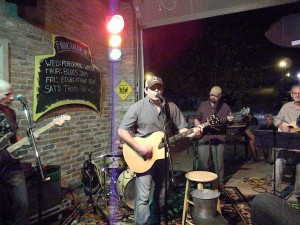 Kiss Alive II album so much that he probably knows “every sound on that record.”
Kiss Alive II album so much that he probably knows “every sound on that record.”
“Not having access to music at all times made me love it more,” he said. “We didn’t have iPods back then so you had to make the effort to buy and listen to it.”
Rhett said his early songs were very personal. “I would write songs in deer blinds about girls back in high school. Back then, I was just writing what I knew and what was true to me.”
Rhett first came to Nashville with his grandpa who knew an entertainment lawyer through a family connection. Through this connection, Rhett met John Jarrard, a hit songwriter in town. John was blind and counted the steps from his home to his Music Row office to write each day.
“I guess he liked me and thought I had potential,” said Rhett. “We started writing songs together and I learned a lot from him.”
Not long after, Paul Worley signed both Rhett and Terri Clark to Sony/ATV publishing as writers and artists. Rhett was with Sony from 1993 to 1996. [Note: He didn’t have a publishing deal for 10 years (because he was writing songs for himself as an artist). He signed a co-publishing deal with EMI in 2006, and since EMI was purchased he now writes for Sony again.]
Rhett admits that in his early career, the biggest mistakes he made were in trusting people on a handshake, like he had in his hometown in Georgia.
“I’m really glad that my granddad and our lawyers were smart enough not to lock us into lifetime contracts,” said Rhett. “Those contracts cost a lot of bands a lot of money to get out of.”
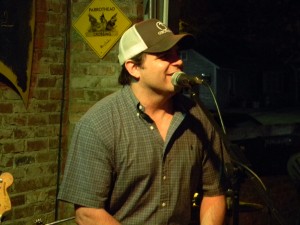 He said that sometimes speaking his mind has also been a mistake, but that’s not something he regrets much. Even though some choices weren’t the best for his career, they were the best for the music he was creating.
He said that sometimes speaking his mind has also been a mistake, but that’s not something he regrets much. Even though some choices weren’t the best for his career, they were the best for the music he was creating.
Pinch me moments…
When asked about some of his career ‘pinch me moments’ Rhett said there were a lot of them. Here are a few he mentioned:
• When he was 22, Rhett was sitting in Donna Hill’s office when the phone rang and she said, “Hang on a minute, it’s Conway.” Rhett was a huge Conway Twitty fan, and could hear his idol’s voice on the phone.
• He was at the AMA awards one year sitting between LL Cool J and The Smashing Pumpkins.
• Hank Williams Jr. recorded one of his songs, “Thirsty,” on an album he did in 2010.
• He toured with Reba and was on the David Letterman show.
Nowadays…
Rhett said he’s evolved as a writer in how he writes and where the ideas come from.
“When you write over a 100 songs a year, you start pulling ideas from anywhere and everywhere,” he said. “I still want to write what’s true, it just might be someone else’s story.”
And sometimes he even has a specific artist in mind when he’s working on a song.
“When we were writing ‘Honeybee’ the chorus came first,” he said. “We knew that the verses had to be a little crazy because a girl would just laugh if a guy actually said, ‘you be my little Loretta, I’ll be your Conway’ and the other lines in the chorus. Ben [Hayslip] and I were thinking about Blake Shelton for it because he has the sense of humor to pull off a song like that.”
“Honeybee” became a number one Billboard hit for Blake, making it just one of the songs that Rhett and the other Peach Pickers (Dallas Davidson and Ben Hayslip) have written in recent years.
So, what is a writing session like with the Peach Pickers?
“We are really laid back about it,” said Rhett. “We usually get together around 11:00 every Wednesday and talk about hunting and sports for a bit. We eat lunch and then usually someone has an idea to work on. If we don’t finish it that week, we get to it again the next week.”
Dallas and Rhett are usually thinking about the music, while Ben is more focused on lyrics. The three have written so much together they’ve built up a lot of trust.
“We tell each other when we don’t like something, and sometimes we think the songs should go in different directions,” said Rhett.
Despite all of his success, Rhett is quick to point out that the music industry and which songs get cut is still a mystery to him.
“I don’t understand why some songs suck and somehow they become a hit, while other songs you think are hits never make it,” he said. “I just show up everyday because you never know when the magic is going to happen.”
Rhett likes being a songwriter because writers don’t have the pressure of radio that artists do and “you can write 10 bad songs and not worry about it, but an artist can’t record too many bad songs in a row if they want a career.”
Rhett isn’t afraid to cross genres as a writer. He recently collaborated on some rap music with T-Pain and said that in his view the new era of country is really headed musically in a more rock/pop/hip-hop direction.
Accomplishments aside, you can’t help but want to shoot the breeze with Rhett. He’s got a laid-back small town swagger, and he isn’t afraid to be who is his.
For more information on Rhett, visit his website. For more information on monthly Berklee alumni events in Nashville, visit Nashville Berklee Jam (events are free and open to the public). To view the original blog post and other music industry articles by Shantell, please visit her website at www.shantellogden.com. If you’re interested in reading a in-depth interview with Rhett about songwriting, check out “The Nashville Musician’s Survival Guide” by Eric Normand
Jack Pearson at the Nashville Berklee Jam – August 14, 2011
Guitarist, singer, songwriter, producer and session-musician, Jack Pearson shared some unique perspective about his musical journey with a room full of Berklee alumni and others from the Nashville music community last Tuesday. The Nashville Berklee Jam, held monthly at the Fillin’ Station in Kingston Springs, saw some new faces and old friends on this special night, and Jack’s decades of experience as a world-class musician provided a rare peek behind the curtain for all those in attendance.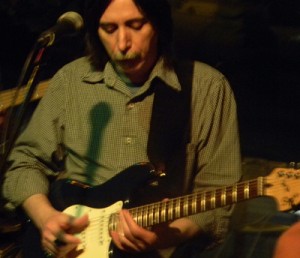
Jack’s musical career began in the mid 1970’s, when he played in multiple bands and logged his first recording session at age 16. In 1993 the Nashville native began his relationship with The Allman Brothers Band as a sub for Dickey Betts, eventually becoming a member of the ABB from 1997-1999 and also touring with Gregg Allman & Friends. Over the years he’s also worked with Vince Gill, Delbert McClinton, Jimmy Buffett, Earl Scruggs, Bobby “Blue” Bland, Amy Grant, Faith Hill, Gov’t Mule, Buddy DeFranco, and countless others.
Jack began his part of this night by playing some beautiful sketches of “I Can’t Get Started”, and for those who have never heard him play, his ability to transport an audience through time and space with nothing other than an unaccompanied electric guitar became quickly apparent. Following the spontaneous applause, Jack cut straight to some Q & A. One of the first questions asked was about his guitar, and I found it interesting that the deep, rich tone coming out of our backline Fender Deluxe originated from a Fender “Squire” Stratocaster, which he had recently bought for $100 at a pawn shop. Plugged into nothing other than a lone tube screamer, this drove home the point that great tone comes from within.
Learning from his oldest brother, Jack was exposed to rockabilly and blues as a teenager and explored the music of Chuck Berry, The Ventures, and Carl Perkins at a young age before eventually discovering jazz greats like, Wes Montgomery, Django Reinhardt, and Charlie Christian. Learning from friends, other musicians, and records, he slowly pieced together his musical vocabulary. He shared some thoughts on how to approach a II-V turnaround, demonstrating some different voicings and melodic approaches, underscoring the importance of putting song and melody above the technical understanding of modes and scales.
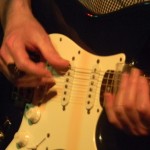 “It takes a lot of experimenting… a lot of guys come to me that get out of school and they say, “when I hear this chord I’m supposed to play this mode and scale”, and it locks them up. They can’t make any melodies because they’re told to play a mode or a scale.”
“It takes a lot of experimenting… a lot of guys come to me that get out of school and they say, “when I hear this chord I’m supposed to play this mode and scale”, and it locks them up. They can’t make any melodies because they’re told to play a mode or a scale.”
This simple, but prophetic thought resonated, and I had flashes to a time in my life when I over analyzed the music I played. Jack drove this point home with “…it comes down to the chord and the melody and where it’s going to…”
He went on to talk about the blending of styles and how he went through different periods of his life where he would be deeply immersed in a singular style for a few years – Delta blues, jazz, etc., and that after a while, all these different styles started coming together. Not afraid to take some chances musically, he demonstrated how he might go from a Howlin’ Wolf lick to a Charlie Parker lick within the same phrase, and that while some players will say this is wrong, he believes that “the main thing is to get the music out, and play with feeling.”
In response to a question about some of his best and worst gigs, Jack said that some of the worst gigs are when people don’t listen, and the music that you play with somebody is more important than the venue, or how famous somebody is.
He explained how learning all of the Allman Brothers songs as a kid helped put him in the position to sub for Dickey Betts on an early 90s Allman Brothers tour, which led to some recording with Gregg Allman and eventually to a phone call from Greg in which he was asked if he wanted to join the Allman Brothers band.
He candidly shared how this landmark gig damaged his hearing, causing an already existing case of Tinnitus to worsen, ultimately forcing him to leave the gig, perhaps sooner than he otherwise would have.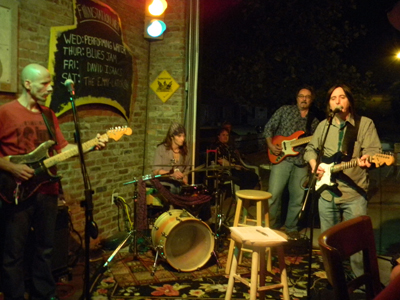
“There’s really no way to describe how loud it was on stage…Dickey Betts wasn’t in the PA…he was 135 dB side stage…”
As a fellow tinnitus sufferer I completely related to this portion of his talk and gained some new perspective as he explained that, despite wearing earplugs, extreme SPL’s (sound pressure levels) can still do damage, as the sound can affect your inner ear by entering your nose, mouth, and through your bones.
In response to a question about life lessons learned through music he answered, “Try not to take music for granted, it’s so special, and you can reach so many people…lyrics can encourage you, relate to your pain, but you can also do it with notes.” He demonstrated this by showing how the same group of notes can sound happy, or sad depending on where the emphasis is placed. He talked about the endless possibilities of how you can play even a single note, demonstrating this concept by playing a huge range of variances on a high “G” note.
After Jack’s talk concluded he played a short set with our Alumni House Band, the air becoming filled with the sounds of spontaneous applause after each inspired performance. Jack left shortly after his set, and the other alums in attendance continued jamming into the night. I, and everyone else in attendance would like to extend our appreciation and gratitude to Jack for sharing his music and journey on this special night!
Our next Nashville Berklee Jam will feature country music artist and hit-songwriter, Rhett Akins on Tuesday, September 11 at The Fillin’ Station. For more info, go to www.nashvilleberkleejam.com.
The Nashville Berklee Jam Goes Public
Today I want to tell you all about an exciting monthly event I have been hosting – The Nashville Berklee Jam, and its new accessibility to everyone in the Nashville music community. The beginnings of this idea came to me a few years ago when I first attended the annual Nashville Berklee Alumni Reception. On my way home that night, I remember thinking how great it was to meet so many musicians in one night who were so passionate about their musical ambitions and so hungry for knowledge. These musical comrades were a mix of Berklee alumni residing in middle Tennessee and Berklee students who came down for the annual Nashville field trip. At this reception I made connections with other like-minded alums and students who came down on the field trip, the latter peppering me with questions about my experiences in Music City. This event was a very stimulating night as the energy of three hundred musical minds meeting and conversing seemed to create an air of camaraderie and untapped potential! Then I went home and another year passed before I got this fix again.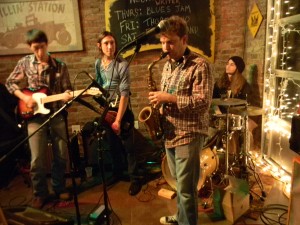
So this past winter I decided to create a monthly event to try to emulate this musical networking hoedown on a smaller scale, and The Nashville Berklee Jam was born. Held on the first or second Tuesday of the month from 7 PM to 11 PM at The Fillin’ Station in Kingston Springs, TN, these events start out with an informal meet and greet, followed by a Nashville music industry guest speaker, and end with an open jam. So far the reception has been very positive, here’s a recap (with links to their corresponding blogs):
February – A-list session bassist, Mike Chapman gave a great talk about being a session musician, outlining key concepts in what he calls, “the essential slices of the session player pizza”. He also jammed with several alums after the talk.
March – award-winning vocal coach, producer, and hit songwriter, Judy Rodman gave an insightful talk about career paths for vocalists. She also performed a couple of songs with the house band and then critiqued and coached several vocal performances, helping vocalists make instant improvements.
April – Stevie Ray Vaughan keyboardist, Reese Wynans shared his fascinating story about being a lifelong-career musician, the life-changing moment that came on his last night with Delbert McClinton that landed him the SRV gig, and the whirlwind years that followed. After his talk, he joined us for a few inspired performances.
May – fellow alum, musician, and author of “The Nashville Number System”, Chas Williams gave an introductory class on this subject. After the class, he charted one of alum, Sarah Tollerson’s originals and performed it with Sarah and the house band with everybody reading the chart off a dry erase board.
June – drummer, producer, and clinician, Rich Redmond gave an inspiring talk on “Navigating the Nashville Music Industry” speaking candidly about his early “lean years” in Music City and different approaches to finding success here. After his talk he sat in for a few tunes and stuck around to chat with others in attendance.
For our next event, to be held on Tuesday, July 10, I will be giving a talk that continues last month’s theme – “Navigating the Nashville Music Industry – Part Two”, during which I will explore some of the concepts I write about in my book “The Nashville Musician’s Survival Guide”. And, this just in, for our event in August we are proud to announce that the guest speaker/performer will be none other than Nashville guitar ace, Jack Pearson, formerly of the Allman Brothers, Vince Gill and many others.
All of the guest speakers have given great talks, sharing their knowledge and providing inspiration, and these talks have been interactive with many great questions and comments from alums. My band, Skinny Buddha (comprised of Berklee alumni and others from the Nashville music community) provides backline and a starting point for the laid back jams which have covered everything from originals to classic rock to blues tunes to two-chord jams. All of these events have been great friendship building and networking experiences for all involved, as well as educational. So far, the attendance has been mostly comprised of Berklee alumni, but as there seems to be a growing interest from others in Nashville, we are now officially making this event open to the Public. Nashville is a diverse and complex music community in which a Berklee alumni community also resides, and it is my goal to help these two worlds intersect and meld together.
So come on out to our next “Nashville Berklee Jam” On Tuesday, July 10. I hope to see you there!
P.S. if you have any comments, thoughts, or questions, please feel free to e-mail me at eric@ericnormand.com

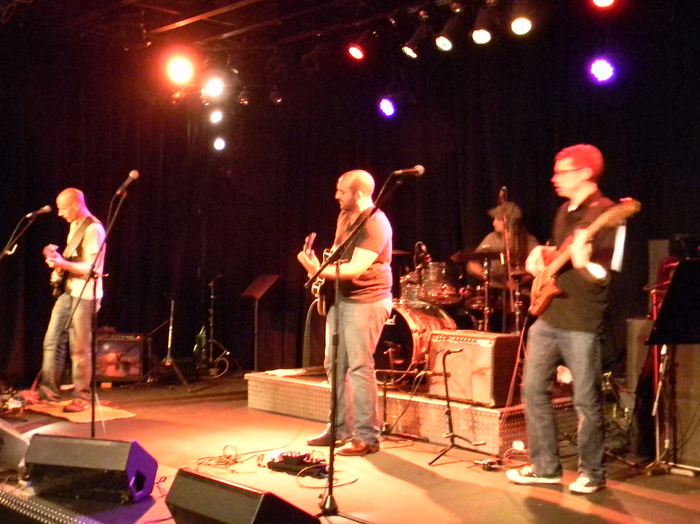
 Dallas Davidson Talk – 35 min
Dallas Davidson Talk – 35 min The One That Got Away
The One That Got Away Gimme That Girl
Gimme That Girl I Don’t Want This Night To End
I Don’t Want This Night To End Country Girl Shake It For Me
Country Girl Shake It For Me